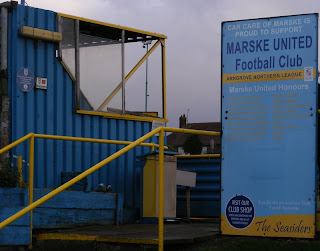"Why
Glentoran?" a Linfield fan asks me. "Talk about going from the sublime to the ridiculous." The taxi driver laughs as he takes our fare. "Glentoran - Donegal Celtic? Hope you're not expecting much in the way of football there, lads," he says, shaking his head. "You'd have been better off staying in the bar."

Just weeks after receiving a winding-up order over an unpaid tax bill of nearly £300,000,
Glentoran are in a complete mess off the pitch, with overall debts reported to be over £1 million and rising. But recent rumours of a mystery benefactor and Linfield's defeat at Cliftonville have given the fans something positive to talk about, and with ticket vouchers for the Big Two derby ("Bigger than Rangers against Celtic," one Glentoran fan insists) on offer to early arrivals a queue's already formed as we pull up outside the turnstiles.

We've been sent a list of bars but can't find anything around the stadium except for parked cars, semi-detached houses and a stall selling t-shirts and pin badges. With an hour to kick-off, our last remaining option is the Fonacab Lounge inside the main stand. "Have you not got Guinness on tap?" I ask the barman. "Sorry, only in small bottles," he says, pouring it with a head so large it almost reaches the top of the glass. I'm still fighting my way through the foam when two representatives of the
Spirit of 41 fundraising committee enter the room. "We don't know any more than you do about this benefactor," says Simon Kitchen, committee member and Business Development Manager for Fonacab, the club's main sponsor. "We're here to talk about the money we've raised so far. We've got over £13,000 but there's a £2,500 electricity bill upstairs right now, and if it's not paid next week, the lights go out and we don't have any more games." "The board should be here to answer our questions," says someone at the bar. "We all know what got us in this mess," replies another voice. "The board and the fans want success and they overspent chasing it." "We're hoping to have £25,000 by January 1st," Kitchen tells the room. "Let's hope this benefactor guy's for real," someone says. "Cos if he isn't, we won't have a club to support."

Not even their biggest enemies would welcome that. "Much as I hate them, the Glens would leave a big hole in Northern Irish football if they went bust," a Linfield fan told me. "They've been trying to compete with us financially, but keeping up is killing them." Twenty-three times Irish League champions, Glentoran were founded in 1882, their red, green and black colours taken from the blazers of Dublin's Phoenix Cricket Club, whose players were touring Belfast at the time. Danny Blanchflower, Jimmy McIlroy, Billy Bingham and, more recently, ex-Hull City winger Stuart Elliott and Dunfermline's Andy Kirk all started their careers at the club. In the 1967 European Cup the Glens held Benfica to a goalless draw at the Stadium of Light, becoming the first ever club to exit the competition on away goals; seven years later they lost to Borussia Mönchengladbach over two legs in the quarter-final of the Cup Winners' Cup.
 Donegal Celtic
Donegal Celtic didn't exist when Eusebio played at the Oval. Founded in 1970, but denied entry into the Irish League until the Equality Commission took up their case in 2002, DC have spent the last few years yo-yoing between the top two leagues ("They're still not up to this division but they'll be much too good for the one below," I was told in the bar at Solitude). With just four wins from eighteen games, the away side sit deep, content to let Glentoran do what they can with the ball. Nothing happens in the first thirty minutes, but then a Donegal shot strikes the base of the post and an ugly tackle near the halfway line leads to at least three players being shoved to the ground, one being dragged back by his throat, and the referee, to everyone's surprise, producing just a single yellow card.

The home fans get increasingly frustrated, and a misplaced backheel brings a collective groan of dismay. "For fuck's sake lads, we've got no shape," someone shouts. "There's no urgency!" "Come on Glens, do something." Fifteen minutes have gone in the second half when the game's finally settled by a moment of class from Matty Burrows (shortlisted for FIFA's Goal of the Year after doing
this to Portadown), who scampers onto a through ball, takes one look up, and calmly lifts his shot over the retreating goalkeeper's head.
With Belfast's recent snowfall, Glentoran's next major fixture is likely to come in the Royal Courts of Justice on January 13th. Football fans everywhere should hope it doesn't end in defeat.

Admission: £10
Date: 12th December 2010






















































